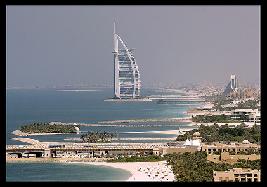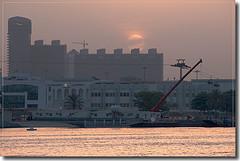Search Powered by Google

Economic History of Dubai and the United Arab Emirates
Throughout history Dubai has operated as a trading hub for exports to the Far East, India, and Africa. Historically its entire economy was built on its reputation and position as a trading centre and at one time Dubai was a very underdeveloped state. All this changed in the 1960s with the discovery of oil in the United Arab Emirates.
By 1985 the UAE had the highest per capita income in the world and the black gold profits have enabled the United Arab Emirates’ forward thinking leaders to invest in capital improvements and social services and to implement numerous construction projects through which the infrastructure of each of the seven states has been massively expanded and successfully modernised. The establishment of the UAE has been good for the entire region, bringing stability and unrivalled economic expansion to the Arab world. Dubai is the second largest of the seven states forming the United Arab Emirates and the fastest growing both economically and in terms of population.
Oil and the petroleum industry dominate the economy of the UAE with Dubai’s strong economy having been especially buoyed by its oil industry. However, the state’s wise leaders are aware that oil reserves can only last another 30 or so years and have embarked upon an aggressive and major diversification program. It is hoped that Dubai’s dynamic and far reaching developments in the industrial and commercial fields will result in these enterprises taking the place of oil as the predominate commodity for the state’s economy - without reducing the state’s wealth and dominance. This policy has already paid dividends and brought about very positive results for Dubai, as the city is now recognised as a prominent industrial and commercial world player.
Establishment of the Jebel Ali Free Zone in Dubai
The Jebel Ali Free Zone was the first and biggest free zone created in Dubai. It was established following a Dubai Government decree on the 9th of February 1985 and is an incredible example of the entrepreneurial spirit of the free thinking city. Since its establishment the Dubai government has invested over USD 2.5bn into the zone to further its potential.
It is the largest commercial and industrial ‘free zone’ in the Middle East and offers the best tax incentives in the world for both private investors and commercial business. It is directly linked to the Jebel Ali Seaport which is located about 40kms from Dubai city centre. The harbour is the largest, most advanced and efficient man made harbour in the world which in turn is linked to Dubai international airport’s state-of-the-art air cargo village. The village and the seaport combined allow for the world’s fastest sea-air transport turnaround in as little as 4 hours, and the strategic location of the free zone and Dubai itself allows for companies to have easy access to the 1.5 billion consumers in the countries surrounding the Gulf and Red Sea.
The Jebel Ali Free Zone offers the facilities and infrastructure to satisfy the needs of virtually every type of business or industrial enterprise, it has excellent warehouses, office spaces, and even factories in place and available for lease, and it further offers considerable financial incentives to companies operating in the zone. Such a company is free from personal and corporate taxes for 15 years with this 15 year period then renewable for another 15 years! Further incentives offered to attract and establish business in the zone include offering companies and their managers a very liberal business climate in which to operate.
Companies operating within the free zone are not required to adhere to the partnerships rules applicable elsewhere across the region where foreign ownership of a company can account for 49%; necessary personnel can be recruited from anywhere in the world, furthermore there are no import or export duties payable within the zone and there is 100% repatriation of both profit and capital within the zone. To those individuals considering retirement with assets that they would like to invest in a state where their tax liabilities are limited, the advantages of the Jebel Ali Free Zone are also obvious!
The Jebel Ali Free Zone is now home to over 2,000 companies from over 70 countries, many of these companies are leaders in their industries, and the zone was just the beginning of Dubai’s plans! Further free zones have been established in and around the city since and even more are being planned. The free zones are physically defined areas where none of the principal restrictions on doing business in Dubai apply to those located in these areas and they have all been created as part of Dubai’s plans for building economic strength through diversity.
Development of Further Free Trade Zones in Dubai
Dubai welcomes investors and entrepreneurs, it welcomes foreign workers, international companies, individual investors, and above all it welcomes investment and development. It is a future focused forward thinking state, and nowhere is this more obvious than in the infrastructure that Dubai has developed, and the free zones it has established to encourage international investment.
In terms of the infrastructure Dubai can offer residents, visitors, investors and businesses, it ranks as one of the best in the world! The telecom and internet links and its ports, roads and airport are the best in the entire region. The international airport in Dubai handles over 55 airlines and about 150 flights a day and is second only to Tokyo in the number of daily transit passengers it handles and it is second only to Seattle as an air/sea port with Jebel Ali harbour the most important port in the Middle East and ranked among the world’s top 15 ports in terms of container throughput.
Add to all that the banking systems in Dubai which have been exclusively and carefully designed to provide the services that both businesses and consumers require and the strength of Dubai’s currency, the Dirham, which is dollar linked, and you have the foundations on which the strong free zones have been built. The amount and level of investment that the Dubai government has made to attract foreign long term investment means that companies have faith in the state and are willing to do business there. An example of the lengths that the Dubai government will go to and how their faith and investment pays off can be seen when examining the most recent free zones that have been established.
Dubai was quick to understand the future long term implications of the 1990s technology boom, and despite the ensuing global slowdown in overall technology and media spending they knew that the media and internet were the future. Dubai’s government directly approached many major multinational corporations in the industries to ask them what they would desire from an internet or media ‘free zone’ in Dubai and with the feedback they received and the experience they already had with the Jebel Ali free zone, they established free zones dedicated to internet and media technologies.
Dubai Internet City and Dubai Media City (referred to jointly as DIC) were born!
Physically located in Dubai’s latest business district along a two-kilometre stretch of the road west of the city centre, the Internet and Media cities have exploded in popularity! Companies such as Microsoft, Reuters, Canon, McGraw-Hill and CNN have all invested heavily in the zone and have committed long term to the free zones. In terms of real estate costs and leasing fees the zones are not cheap, but in terms of the value they offer a company with the technical infrastructure and the taxation and business opportunities, the zones are unrivalled.
No longer does any company have to partner with a local sponsor to operate - 100% business ownership in the zones is granted. Furthermore the overall business laws give companies much more operating freedom, they have a guaranteed 50 year personal, income and corporation taxation exception and they are free from paying any customs duty which overall means companies within the zone have far reduced operating costs, and far higher potential for maximizing profits.
The universal praise received by the government of Dubai from the corporate tenants of their established free zones has led to more free zones in the planning and also the establishment of the Dubai International Financial Centre (DIFC). This is an onshore capital market designated as a financial free zone and it was established in 2004. It has been designed to “create a unique financial services cluster economy for wealth creation initiatives”. In other words it has been established to create an environment for further economic growth in the region.
The Dubai International Financial Centre (DIFC) is split into six divisions:
Business in each section will benefit from zero tax on income and profits, 100% foreign business ownership, no restrictions on foreign exchange or capital/profit repatriation, operational support and business continuity facilities.
Dubai Airport Free Zone was established in 1996 and is physically located within the boundaries of Dubai’s international airport, it has over 460 companies already benefiting from the following impressive list of incentives:
Companies such as Bang & Oulfsen, Boeing, Caterpiller and UPS already benefit from the zone and many of the companies within the zone rely on it for delivery of luxury or temperature-sensitive goods.
And the latest addition to the Dubai free zone family will be the Dubai Maritime City. This will be a 2.5 million square meter marine development to service key marine and maritime related industries, it is expected to be completed by 2006.
It seems that Dubai offers companies and their employees a brand new world within our world! The unique standard that Dubai’s government has established is serving them very well, with the success set to continue. Dubai has the fastest growing population in the world, it is one of the most exciting cities in the world, it is stunningly beautiful, it has managed to combine ethnic diversity with harmony and it offers its residents the highest standard of living possible.

